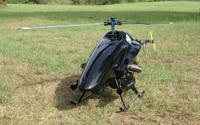-
New digital steganography detection solutions
Steganography is the art and science of writing hidden messages in such a way that no one, apart from the sender and intended recipient, suspects the existence of the message, a form of security through obscurity; a Pennsylvania company offers a digital steganography detection solution
-
-
First responders to get a break on car insurance
First responders in Maine could be getting a break on their insurance thanks to a bill making its way through the State House of Representatives; under the proposed bill, insurance companies would not be able to increase the personal insurance rates of emergency responders if they get into a car accident while performing their duties
-
-
Researchers fire 1,000th shot on laboratory railgun
Scientists reached a milestone in the Electromagnetic Railgun program when they fired a laboratory-scale system for the 1,000th time on 31 October, the raygun is a long-range weapon that launches projectiles using electricity instead of chemical propellants
-
-
Sector Report for Wednesday, 1 November 2011: Law Enforcement Technology
This report contains the following stories.
Plus 1 additional story.
-
-
Zombie herd tests Ohio’s emergency response capabilities

On Monday, a horde of ravenous flesh-seeking “zombies” descended upon Wesleyan University and tested the response capabilities of Ohio’s emergency personnel; in the spirit of Halloween, Delaware County recruited 225 volunteers to dress up as zombies and participate in a drill designed to help prepare first responders deal with real situations like hazardous material cleanups
-
-
U.S. Army to deploy “kamikaze” drones
The U.S. Army is getting ready to add a “kamikaze drone” to its arsenal; the new drone is designed to hover quietly in the sky before it dive-bombs directly into a human target
-
-
Mathematicians help LAPD fight gangs
UCLA mathematicians working with the Los Angeles Police Department to analyze crime patterns have designed a mathematical algorithm to identify street gangs involved in unsolved violent crimes
-
-
U.K. police technology allows tracking, controlling cell phones remotely
Civil rights groups in the United Kingdom are up in arms over the revelation that the U.K.’s largest police force, the Metropolitan Police, has acquired the technology to shut down cell phones remotely, intercept communications, and gather data on thousands of users in a targeted area
-
-
Law agencies want YouTube police brutality videos removed
In Google’s latest Transparency Report, the company revealed that there has been a 70 percent increase in requests by law enforcement agencies to remove police brutality videos from YouTube; according to the report, from January to June of 2011 the “number of content removal requests we received increased by 70 percent” compared to the period from July to December of 2010
-
-
New iOS Forensic Toolkit circumvents iOS 5 security measures
While Apple gave a minor facelift to the whole security system in iOS5, it made significant changes regarding keychain protection, replacing the encryption algorithm entirely; but criminals thinking they can thus use the latest iPhone and iPad devices to store information may want to think again, as a new information acquisition solution cracks the latest iOS5 security measures
-
-
BVS helps U.K. prisons detect cell phones
Berkeley Varitronics Systems (BVS) has made quite a splash in recent weeks announcing a new partnership to distribute its cell phone detection technology in the United Kingdom, adding several options to its line of multi-band transmitters, and teaming up with Los Angeles Laker Andrew Goudelock
-
-
Laser Energetics delivers Dazer Laser GUARDIAN
Mercerville, New Jersey-based Laser Energetics, Inc. has announced the delivery of their Dazer Laser GUARDIANS; the initial delivery was made yesterday
-
-
Texas county police buys drone that can carry weapons

The police in Montgomery County — and area north of Houston, Texas — is the first local police in the United States to deploy a drone that can carry weapons; the police says it will be used in chases of escaping criminals and tracking drug shipments
-
-
"The Dragon" makes life difficult for first responders
For emergency personnel in Tennessee, responding to calls on “The Dragon,” an unforgiving 11.1 mile stretch of highway, is no easy task; the Dragon consists of 318 sharp curves through hilly terrain making it treacherous for drivers and a nightmare for first responders; each year there are several fatal crashes and since 2005 the desolate road has been the scene of at least forty injury crashes a year
-
-
U.A. Navy sees blimp come-back

In 1962, after forty-seven years, the U.S. Navy effectively terminated Lighter-Than-Air (LTA) operations; but the blimp is making a come-back, and on 26 October, the Naval Air Warfare Center Aircraft Division and the U.S. Naval Research Laboratory unveiled the MZ-3A airship; for now, it is the only manned airship in the U.S. Navy’s inventory
-
More headlines
The long view
Why Was Pacific Northwest Home to So Many Serial Killers?
Ted Bundy, Gary Ridgway, George Russell, Israel Keyes, and Robert Lee Yates were serial killers who grew up in the Pacific Northwest in the shadow of smelters which spewed plumes of lead, arsenic, and cadmium into the air. As a young man, Charles Manson spent ten years at a nearby prison, where lead has seeped into the soil. The idea of a correlation between early exposure to lead and higher crime rates is not new. Fraser doesn’t explicitly support the lead-crime hypothesis, but in a nimble, haunting narrative, she argues that the connections between an unfettered pollution and violent crime warrant scrutiny.
Bookshelf: Smartphones Shape War in Hyperconnected World
The smartphone is helping to shape the conduct and representation of contemporary war. A new book argues that as an operative device, the smartphone is now “being used as a central weapon of war.”
